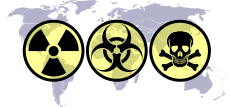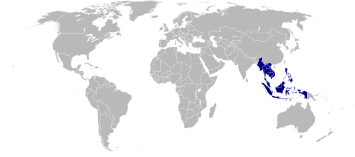Philippines and weapons of mass destruction
| Weapons of mass destruction |
|---|
 |
| By type |
| By country |
|
| Proliferation |
| Treaties |
|
Philippines is not known or believed to possess weapons of mass destruction. Article II Section 8 of the Philippine Constitution explicitly forbids the presence of nuclear weapons in the Philippines.
The Philippines, as a ratifier to the Biological Weapons Convention, bans all production and import of biological weapons in the country. It also signed the Southeast Asian Nuclear-Weapon-Free Zone Treaty, thus promoting a nuclear-weapons-free Southeast Asia.
Nuclear energy and weapons

The Philippine nuclear program started in 1958 with the creation of the Philippine Atomic Energy Commission (PAEC) under Republic Act 2067.[1] A year after Ferdinand Marcos declared martial law in 1972, he announced the decision to build a nuclear power plant at Bataan.[1] This was in response to the 1973 oil crisis, as the Middle East oil embargo had put a heavy strain on the Philippine economy, and Marcos believed nuclear power to be the solution to meeting the country's energy demands and decreasing dependence on imported oil.[2] The plant was completed in 1984. However, two years later in 1986, the year in which Marcos was ousted from power following the People Power Revolution, and the same year in which the reactor at Chernobyl, Soviet Union (now part of Ukraine) accidentally exploded, the new president Corazon Aquino decided not to operate the plant,[1][3] due in par to dilemmas concerning its position near major fault lines and Mt. Pinatubo, which erupted in 1992.
During the Cold War, specifically at the time of Marcos regime from 1965 to 1986, American nuclear warheads were secretly stockpiled in the country.[4] The Filipino public never knew of it until much later after the regime, and only Marcos knew of it as he was secretly informed by American military advisers as early as 1966. Currently, however, there was a movement in the country that aims to stop construction of nuclear power plants in the country and terminate American military presence in the country, which were believed to house nuclear weapons on Philippine soil.
Despite provocations by China since 2010s, President Benigno Simeon Aquino III disagreed on letting have the Philippines have nuclear weapons.[5] He justified it from the lack of government funds to create such weapon, coupled with the fact that having such weapon would only escalate tensions between the two countries.
Biological and chemical weapons
Rebels from the communist New People's Army were accused of using biological weapons against the Armed Forces of the Philippines in eastern Mindanao, but they refuted such a claim.[6]
Philippines signed the Chemical Weapons Convention in 1993.
References
- 1 2 3 Valdez-Fabros, Corazon. (1998-10-16) The continuing struggle for a nuclear-free Philippines. WISE News Communique. Retrieved 2005-08-17.
- ↑ ABS-CBN News. (2007). ABS-CBN Interactive Retrieved 2007-06-13.
- ↑ Lee, Yok-shiu F.; Jeff So; Alvin Y. (October 1999). Asia's Environmental Movements: Comparative Perspectives (Asia and the Pacific). M E Sharpe Inc. ISBN 978-1-56324-909-9. External link in
|publisher=(help) Retrieved 2008-08-26. - ↑ US secretly stored nuclear weapons in PH
- ↑ Aquino thumbs down nuclear weapons for AFP
- ↑ Filipino Rebels Deny Biological Warfare Charge